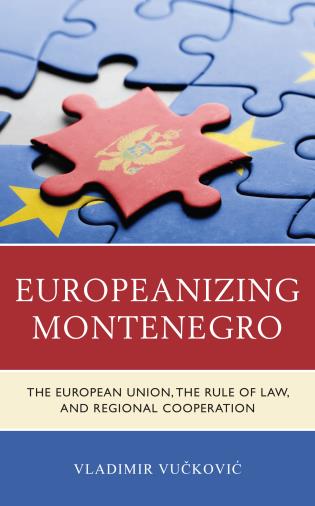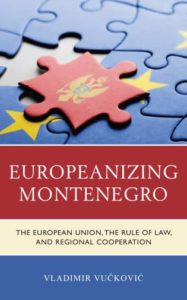
Europeanizing Montenegro: The European Union, the Rule of Law and Regional Cooperation by Vladimir Vučković

Representatives of the European Union declared at the Thessaloniki Summit in 2003 that the Western Balkans had a future within the European Union and spelled out some conditions that entailed the completion of political and economic reforms and reconciliation efforts between Western Balkan states. Since then, the European Commission (EC) has adopted a number of enlargement methodologies that include specific criteria for new member states to join. However, the enlargement of the Union has lost credibility, and internal disputes between member states have stalled the accession process. On the one hand, all-encompassing crises within the EU, such as the financial and refugee crises, but also the rise of populism, Euroscepticism, the disintegration of the Union, and the pandemic have damaged the Union socially and economically. The recent Russian invasion of Ukraine has brought not only further economic but also geopolitical consequences, which pose a fundamental challenge for the EU. Moreover, the complex functioning of EU’s institutional structure, governance and decision-making process have also impacted the Union. On the other hand, there have been internal problems in the Western Balkan states, which have not consolidated democracy in their mode of governance. Indeed, some states have remained autocratic; others have retained their weak institutions, suffered from patronage and clientelism, or have still not resolved important issues of statehood. These issues combined have caused a series of bilateral vetoes concerning the EU’s accession process of different member states. In fact, the negotiation framework for membership has become an “open-ended” process and, as Vladimir Vučković describes it in Europeanizing Montenegro: The European Union, the Rule of Law and Regional Cooperation here, a farce.
Vučković’s is an important study in which he examines the complex process of accession to the EU for the Western Balkans states. He illustrates this process through the experience of Montenegro, the frontrunner in the enlargement process in the region. He investigates why the EU has failed to exert enough pressure on Montenegro for this country to meet the conditions that were placed on its political institutions as part of the accession process. The analysis is based on the theories of Europeanization developed by Frank Schimmelfenning and Ulrich Sedelmeier, such as rational and constructivist (or sociological) institutionalism, which provide different explanatory models that define different mechanisms of Europeanization. The critical empirical assessment in this book focuses on three political accession criteria: judicial reform, fight against corruption and strengthening regional cooperation and the development of good neighborly relations. The author reviews a wide array of empirical material to examine the outcomes produced by the adoption of EU rules and norms, which occurred in two stages. The first stage, the “pre-negotiation” stage, began with the official signing of the Stabilization and Association Agreement (SAA) in 2007, a year after Montenegro declared its independence. It was during that same year that the European Union signed and brought into force the European Partnership with Montenegro, which was an essential element of the pre-accession strategy. As the European Council attached great importance to the independence of the judiciary and judicial reform and to the strengthening of the fight against organized crime and corruption at all levels of government, Montenegro needed a new constitution that would be in line with EU values and requirements. Therefore, a new constitution was ratified and adopted by the Constitutional Parliament in October 2007. Not long after, Montenegro began to take action to adopt laws and regulations and design action plans aimed at engaging in judicial reform and fighting corruption, in line with the European Commission’s recommendations. At the same time, Montenegro took active steps toward its commitment to regional peace and stability, promoting regional and bilateral cooperation with SAA countries and participating in various regional initiatives. In 2021, once the European Commission had assessed that progress had been made on these issues, the European Council opened accession negotiations with Montenegro.
The second phase of the integration process, which the author examines, ranges from the opening of the negotiations in 2012 to 2017, which corresponds to the time when the country officially opened 26 of the 33 negotiation chapters. The integration process at this stage intensified and the country had to take further concrete steps to meet the Copenhagen criteria and comply with the acquis communautaire (acquis). One of the reasons for this intensification was the so-called “new approach”, which was adopted by the European Commission in 2012. Under this approach, Chapter 23—Judiciary and Fundamental Rights—and Chapter 24—Justice, Freedom and Security—came into focus and became the first chapters to be opened (and last to be closed) in the course of the negotiation process. These two chapters have served to monitor and determine the entire integration process. The first requirements that Montenegro addressed were those imposed by the European Commission and the Venice Commission. Therefore, the Montenegrin government passed new laws and took measures to implement and enforce a new institutional framework and strengthened competencies and professional capacity to reinforce judicial independence and prevent corruption. In terms of regional cooperation, both Montenegro and the EU have been more proactive in improving relations in the region, working in the areas of transport, infrastructure, economic connectivity, youth cooperation and cooperation among businesses and civil society across the Western Balkan states. In addition, a series of summit meetings in places such as Berlin (2014), Vienna (2015) and Paris (2016) was organized under the umbrella of the Berlin Process, which brought further progress during this second phase.
Throughout the negotiation process, Montenegro has only partially fulfilled the conditional criteria. Progress has occurred, as the country has strengthened its legal and institutional framework, as well as its administrative capacity to support the independence of the judiciary and tackle corruption issues. However, the politicization of the judiciary, corruption, and organized crime have remained major concerns. The problems arising from these three political accession criteria are well identified by Vučković, as he argues that not only has the EU failed in Europeanizing Montenegro but that the transformative power of the EU has had negative effects on the fulfillment of several key accession requirements. These negative effects occurred because the EU failed to put pressure on the candidate country, turning a blind eye when it became evident that, instead of tacking core issues, the political elites were making only superficial advances.
The ways in which the EU has progressed in its regional cooperation efforts as an alternative to enlargement has been a sign of the Union’s general lack of interest in enlargement . Indeed, the EU has supported the so-called stabilitocracy, which has favored political elites in the region and allowed them to consolidate their power. Furthermore, the book argues that EU accession demands depend not only on the interdependence of certain factors pertaining to the EU and candidate countries, but also on the influence of international actors who are currently shifting the balance of power. Here, the author appraises Russia and China in particular. Both countries exert influence in the form of soft and hard power on the entire Western Balkan region. In the case of Montenegro, not only has Russia invested in the country’s economy, but it also has supported religious groups, financed political parties and individuals, developed anti-Western media, inspired coups, and so on, leading to the division of Montenegrin society. China, on the other hand, has used soft power tools to enhance its influence in Montenegro. However, Chinese investments in infrastructure have increasing the public debt, resulting in the risk that the country could fail to comply to EU standards about the acceptable level of public debt that a candidate country must demonstrate before being allowed to join the Union. An additional risk is hypothetical: if the state failed to repay its debt to Chinese companies, it could be forced to relinquish sovereignty over parts of its territory, although foreign diplomatic, consular and military property would be excluded from this risk. However, the possibility of EU membership would be jeopardize, even though it has been the main priority of the country’s foreign policy.
This book not only makes an important contribution to understanding the ways in which EU conditionalities work in practice in the Western Balkans, but it also demonstrates that Europeanization, as theorized by Schimmelfennig and Sedelmeier does not apply to the analysis of the integration process in these countries. This work can serve as a starting point in the development of other theories to explain the complex integration process of the Western Balkans. The volume can be used as a lesson to help candidate and potential EU members achieve a quick implementation of the acquis criteria, as it considers all the aspects of the interplay between EU, domestic, and international factors. The current context of the Russian aggression in Europe has given the Union the opportunity to recall its values, fight Euroscepticism, and regain citizens’ trust. After all, Montenegro is a small country with slightly over 600,000 inhabitants, so that the cost to the EU of welcoming this country as a member would be low. Moreover, Brexit has made room for one new member in the Union, so that the institutions would not even need to change. In the face of the clear and solid steps that have already been taken toward the fulfilment of all criteria included in the acquis, the acceptance of Montenegro as a full member of the Union can now be precisely scheduled. Vučković’s book contains important lessons and encourages further research on the role of domestic policies in the integration of Western Balkan countries in the EU, as well as on the geopolitical importance of this regions in general.
Edina Paleviq is a PhD Candidate in Political Science at Andrássy University Budapest. Her research focuses on Europeanization, the EU accession processes in the Western Balkans, and the role of civil society there in the EU integration process. She also focuses on nationalism and ethnicity. She was part of the CES-WSF 2020-2021 Global Digital Fellowship program.
Europeanizing Montenegro: The European Union, the Rule of Law, and Regional Cooperation
By Vladimir Vučković
Publisher: Lexington Books
Hardcover / 282 Pages / 2021
ISBN: 978-1-7936-0775-1
Published on February 21, 2023.




